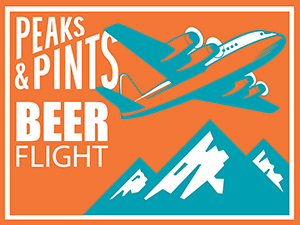 Flash back to the Roaring Twenties, when America was in the midst of the Prohibition: Booze was banned, stealthy speakeasies adorned Tacoma, and the Paramount Theatre sat in Tacoma’s Proctor District, which in 2016 became Peaks & Pints bottle shop, taproom and eatery. Prohibition, the law that prohibited the sale, manufacture, and transportation of alcohol in the United States, was ratified as the 18th amendment on Jan. 16, 1919, and went into effect on Jan. 16, 1920. Dec. 5, 1933, passage of the 21st Amendment, brought an end to Prohibition. You might think there are already enough reasons to party in December. You might think there are enough holidays prominently featuring the consumption of alcoholic beverages. You would be wrong. The anniversary of the day Prohibition was repealed, today, is fast becoming a favorite holiday. We think that deserves a beer. In fact, we think that deserves five beers. Cheers to Repeal Day and our Peaks and Pints Pilot Program: Repeal Day On The Fly.
Flash back to the Roaring Twenties, when America was in the midst of the Prohibition: Booze was banned, stealthy speakeasies adorned Tacoma, and the Paramount Theatre sat in Tacoma’s Proctor District, which in 2016 became Peaks & Pints bottle shop, taproom and eatery. Prohibition, the law that prohibited the sale, manufacture, and transportation of alcohol in the United States, was ratified as the 18th amendment on Jan. 16, 1919, and went into effect on Jan. 16, 1920. Dec. 5, 1933, passage of the 21st Amendment, brought an end to Prohibition. You might think there are already enough reasons to party in December. You might think there are enough holidays prominently featuring the consumption of alcoholic beverages. You would be wrong. The anniversary of the day Prohibition was repealed, today, is fast becoming a favorite holiday. We think that deserves a beer. In fact, we think that deserves five beers. Cheers to Repeal Day and our Peaks and Pints Pilot Program: Repeal Day On The Fly.
Peaks and Pints Pilot Program: Repeal Day On The Fly
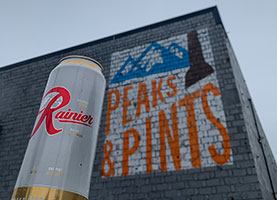 Rainier Beer
Rainier Beer
4.73% ABV, 10 IBU, Crowler fill or can
In 1883, Andrew Hemrich and partner John Kopp established Bay View Brewery in Seattle’s Georgetown neighborhood. Ten years later, Bay View Brewery joined with the breweries of Albert Braun and Claussn-Sweeney to form a new association, the Seattle Brewing & Malting Company. The brand name eventually chosen for the company’s flagship beer was “Rainier.” The Bay View plant continued to operate, and in 1906 added a bottling shop and additional refrigeration. By 1905 production of Rainier Beer reached 300,000 barrels per annum. The company employed more than 300 men, and there was room to build worker homes beside the Duwamish River that then still curved through Georgetown. Kopp and Hemrich produced Rainier beer in Washington until 1916, when the state of Washington enacted its own prohibition, four years before the 18th Amendment enacted the nationwide prohibition. Following the repeal of the Prohibition, the brewery was purchased by Lethbridge, Alberta brewers Fritz and Emil Sick, who then repurchased the Rainier brand and began brewing Rainier back in Seattle in 1935. Today, Pabst Brewing Co. brews Rainier Beer with a satisfying malty flavor over a slightly fruity background, spiced with Chinook, Mt. Hood, and Willamette hop notes.
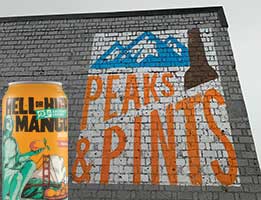 21st Amendment Hell or High Mango
21st Amendment Hell or High Mango
4.9% ABV, 17 IBU, can
In 2000, Nico Freccia and Shaun O’Sullivan founded 21st Amendment Brewery in the South Park neighborhood of San Francisco, California. As avid beer enthusiasts, Freccia and O’Sullivan were determined to establish an ongoing celebration of the overturned 21st Amendment to the Constitution and gave their brewery the amendment’s namesake to commemorate it. Fruit forward beers across the board have been a very popular seller for 21st Amendment. After the breakaway success of Hell or High Watermelon Wheat beer, brewmaster Shaun O’Sullivan decided to go the mango route with Hell of High Mango. A light and refreshing straw-colored beer, fruity and sweet, it’s brewed with real mango and brimming with tropical floral notes.
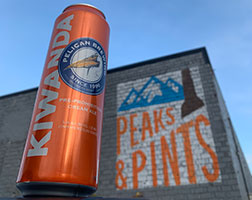 Pelican Kiwanda Cream Ale
Pelican Kiwanda Cream Ale
5.4% ABV, 25 IBU, can
The cream ale style gained popularity in the late 19th and early 20th centuries as ale breweries in the Northeast and mid-Atlantic region looked to compete with ascendant lager breweries. By fermenting ales at cooler temperatures, brewers created crisper, cleaner, less fruity beers that were more in line with pale lagers. The hybridized specialty soldiered on after Prohibition before largely falling out of favor by the 1970s and ’80s. Kiwanda Cream Ale is a nod to founding brewmaster Darron Welch’s love of history and reputation for brewing beers as they are intended to be. Pelican is the first known craft brewer to honor the early American beer. Made of all local, hand-sourced ingredients — Two-row malt, flaked barley, Mt. Hood hops, CaraPils malt, pure local water and pure ale yeast — Kiwanda Cream Ale is pale gold with a fruity, floral hop aroma, golden color, refreshing body and clean, snappy finish. If you love Pelican Brewing Company’s flagship beer Kiwanda Cream Ale, you’re not alone — it’s one of Pelican’s most award-winning brews with 21 honors, including 13 gold medals and Peaks & Pints Tournament of Beer: West Coast Flagships champion.
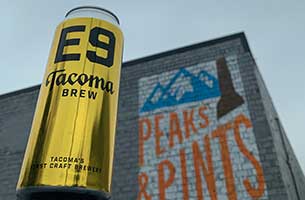 E9 Tacoma Brew
E9 Tacoma Brew
5.1% ABV, can
Columbia Brewing Co. brewed Tacoma Brew in the late 1800s in Tacoma’s now Historic Brewery District. Beer made at the facility gained national attention for its flavor and smooth aftertaste in the early 1920s, prompting the brewery to double in size and increase capacity by the mid-1930s. Success at the plant got the attention of another brewery, Heidelberg Brewing Co., which purchased the Columbia plant in 1949 and set out for another round of remodeling. The facility was bought yet again a decade later by Carling Brewery, making it the only West Coast holding of the otherwise East Coast beer company. The brewery is long gone but Tacoma Brew, a Kolsch, is still being brewed. Tacoma’s Engine House No. 9, now E9 Brewing located in Tacoma’s Historic Brewing District, bought the recipe for the breweries’ “Tacoma” brew and still serves it many, many years after the originating brewery held its last call. Tacoma’s first beer has a medium body accentuated with crisp Northwest hops.
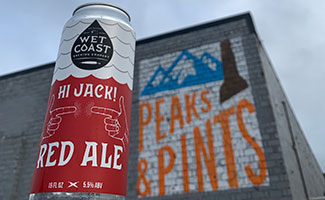 Wet Coast Hi Jack! Red Ale
Wet Coast Hi Jack! Red Ale
5.5% ABV, 33 IBU, Crowler fill
Wet Coast Brewing‘s name is a triple entendre: 1. West Coast, 2. Northwest weather, 3. Prohibition, where citizens voted wet or dry. In 1920, the United States has just enacted the Volstead Act, prohibiting the production and consumption of intoxicating liquors. Bottles were smashed, babies cried, and Americans everywhere were forced to be “dry” and live a life without beer. That is, everywhere but Washington state. Lt. Roy Olmstead with the Seattle Police Department began smuggling alcohol from Canada and soon enough Washington wouldn’t just be a rainy state out west, it would become the Wet Coast. Many Wet Coast beers give a nod to Prohibition days, including Hi Jack!, which was used in speakeasies as a code word for law enforcement. Hi Jack!, the red ale, is brewed with Crystal and Black malts for a deep red hue and smooth body. Centennial hops provide floral and citrus notes with a small amount of bitterness to balance the beer.
